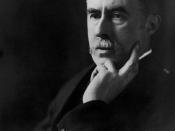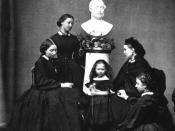"To An Athlete Dying Young"
Dying young is considered by most to be one of the most tragic of fates. The specter of things undone and a life unlived haunts the funeral and colors the grief to an even darker shade. Most people desire to live to a ripe old age (or, at least, they claim to desire it) and would be aghast to have a premature death viewed in a positive light. Yet, this is exactly the driving force behind A.E. Housman's "To an Athlete Dying Young." In the poem, it is implied, if not outright stated, that it is better to die in the glory of youth than to rest too long on one's laurels, only to see those laurels wither.
The setting is the funeral of a young champion runner. Rather than join the others in mourning, however, the speaker is instead reflecting on how lucky the young athlete was to have died when he did, instead of lingering on outlasting the glory of his victories.
Speaking of how quickly the laurels die, the speaker seems to project himself onto the young runner with a knowledge that suggests he, too, once knew these glories. Through the speaker's thoughts, the reader gets a glimpse of what the speaker's life may have been since his youth: his own records broken, his skills diminished, his name forgotten. Instead of being a poem about the death of the athlete, the poem becomes a statement about the life of the speaker. As one of "the lads who wore their honors out," the speaker seems to be also mourning his own special kind of death.
The speaker is happy that the athlete died at such a young age because he sees much of himself in the young champion; yet, he also...


